
LA Plaza de Cultura y Artes hosted a panel entitled “Mass Deportations: The Past is Prologue,” with, from left, Dr. Francisco Balderrama, Karla Estrada, Angélica Salas and Katy Long. Image credit: LA Plaza de Cultura y Artes
“The disgraceful and unconstitutional deportation of American citizens of Mexican descent in the 1930s happened here, right here,” said Leticia Rhi Buckley, CEO of LA Plaza de Cultura y Artes, indicating La Placita Olvera, across the street from the packed museum conference room from where she spoke. “And it's happening again in our community. It’s our responsibility to ensure that no one forgets that history and that we do everything we can to resist.”
On February 26, 1931, amid the Great Depression, a team of plainclothes and uniformed Immigration and Naturalization Service (INS) agents, working with members of the LAPD, sealed off La Placita.
Storming the tiny park, they rounded up 33 Mexicans, two Asians and one Black, the raid triggering the decades-long deportations of more than a million and a half Mexicans and Mexican Americans, which ended only at the onset of World War II.

Attendees of the “Mass Deportations: The Past is Prologue” panel, which was held at LA Plaza de Cultura y Artes, across the street from La Placita Olvera, where the 1931 roundup of immigrants took place. Image credit: LA Plaza de Cultura y Artes Migration Museum
Ninety-four years later, almost to the day, the squalid history and the contemporary implications of that raid were presented in a program titled “Mass Deportations: The Past is Prologue.” Four leading voices in immigration policy, history, and activism recounted last month in a panel what happened that day and the following deportations, offering learnings for what lies in store as the Trump administration begins a new wave of mass deportations.
Moderated by Katy Long, founder and director of the California Migration Museum, which partnered with LA Plaza in presenting the program, the panel featured Dr. Francisco Balderrama, CSU Los Angeles Emeritus Professor and co-author of “Decade of Betrayal: Mexican Repatriation in the 1930s”; Angélica Salas, executive director of the Coalition for Humane Immigrant Rights (CHIRLA); and Karla Estrada, an immigrant justice activist.
The program featured dramatic history scenes from the California Migration Museum’s immersive walking experience, “Ni de Aqui, Ni de Alla. " This experience combines music, oral history, archival research, and augmented reality to explain the complex history that, according to Long, “is relevant right now … but to the extent that it has been forgotten, that’s invisible, even when you visit this neighborhood.”
Dr. Balderrama, considered an expert in the 20th-century history of Mexicans in the United States, began with an overview of the initial raid at La Placita and the deportations that followed. “This was the historic center as it was colonized and Mexicanized from its founding … a target area for the roundup that occurred,” he said. “It was the first time the INS, the ICE of that historical period, cordoned off a public area. It speaks to the American attitude to the Mexican community, in the sense that the Mexican is the ‘other’ at that historical period and today’s historical period.”

Dr. Francisco Balderrama, CSU Los Angeles Emeritus Professor and co-author of “Decade of Betrayal: Mexican Repatriation in the 1930s”, is considered the leading scholar of the unlawful deportation of U.S.-born Americans of Mexican descent. Image credit: Abelardo de la Peña Jr.
He recounted how the LAPD participated in the roundup, which was against regulations, taking people into custody and creating a climate of fear in Mexican Los Angeles and throughout the United States. Balderrama also stated that the INS was responsible for only 10% of the deportations, with companies like U.S. Steel, the Ford Motor Company and Southern Pacific Railroad taking it upon themselves to ship people out. Misnomered as Mexican Repatriation, up to 1.8 million people of Mexican descent, most of them American-born
“People were so fearful they loaded up their cars and headed to the border,” he said.
Activist Estrada, the narrator of the “Ni de Aquí, Ni de Alla” immersive experience, described her memories of living in the President Barack Obama era of deportations. “Everybody thinks when we are in a Democratic rule, we are ‘safe,’ but we are not. We are always in danger,” she said. She remembered how, in 2017, the so-called ‘silent raids’ apprehended not only undocumented immigrants with criminal records but innocent bystanders as well, including her younger brother.

Screen capture from California Migration Museum’s immersive walking experience, “Ni de Aqui, Ni de Alla". Image Credit: California Migration Museum
Attempting to cross back to the U.S., her brother got into an accident, his documentation was stolen, and he was returned to Mexico. “Because of that, my parents decided to self-deport,” she said. “I went from having my entire family to no family at all.”
She drew comparisons between those deported in the 1930s with her own experience. “The fear and anguish of losing my family … those feelings of being paralyzed and confused … the desire of wanting to stay in this nation while knowing that you are absolutely hated … it’s that dichotomy of feelings that I am sure in 1931 [that] the ones who were detained and the ones who were deported felt that rage,” she expressed.
Salas spoke of how when she began her work at CHIRLA in 1995 after the passage of Proposition 187, the anti-immigrant Save Our State referendum, as a volunteer answering their hotline and hearing the sheer fear of callers wondering what would happen to them and their families.”
“For me, deportation, whether it’s 1931 or 1954, or in the ‘70s or ‘80s or now, is the tearing of a people from their homes, from their families, and deporting them by force and absolutely not recognizing their contributions, their rightful place in their country,” she said.
Sharing her history as the child of undocumented immigrants and being undocumented herself, she remembered the fear of ‘la migra’ as the source of constant conversations in their home. “During the ‘70s and ‘80s, there were raids everywhere … there were worksite raids, INS would get on buses … this was not theoretical, this was real,” she explained.

A display in LA Plaza de Cultura y Artes’ “L.A. Starts Here!” exhibition illustrates the origin points of deportations during the 1930s. Image Credit: Abelardo de la Peña Jr.
A worksite raid at the garment factory where her mother worked resulted in the deportation of her mother, uncle and aunt back to Mexico. “My dad, in sheer panic, didn’t understand what to do,” she said. Eventually her mom returned, with Salas witnessing her mom coming out of the trunk of a car. “At that age, I never quite understood immigration law … but you deeply understand that you are devalued as a human being.”
Fortunes changed when, as a result of the Immigration and Reform and Control Act of 1986’s amnesty program, which allowed undocumented immigrants to apply for legal resident status, “we went from being undocumented to suddenly having our papers. It’s a different life, it’s a different reality,” she said.

A permanent monument to acknowledge California’s role in the forced removal of Mexican Americans is located in the LA Plaza de Cultura y Artes’ Historic Paseo Walkway. Image credit: Abelardo de la Peña Jr.
“What I fight for [as the CEO of CHIRLA] is, yes, to defend against all that is horrible that happens to our community and people, but what I fight is for that feeling of just being able to live free and be accepted,” she stated. “So, when we talk about the history of this country, [which is] a horrible history of mistreatment … that is a history we need to know. The history I fight for [is] of the people who stood up and who stand up each and every time injustice happens in this country.”
View the entire program on LA Plaza’s YouTube channel.

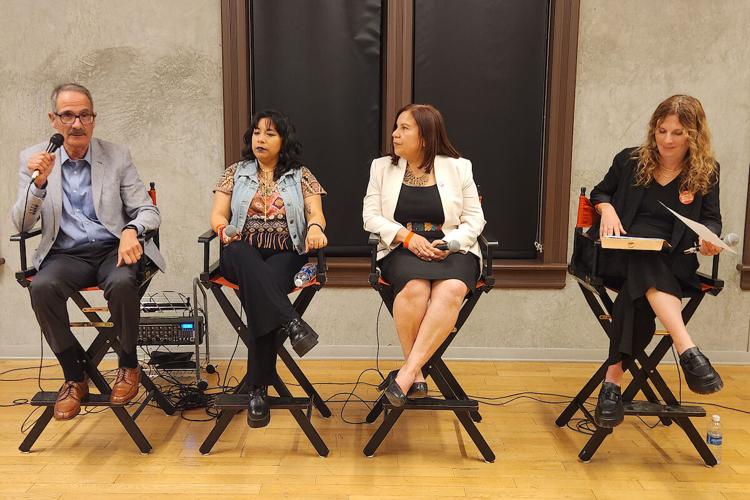
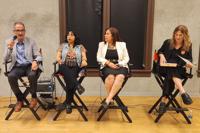

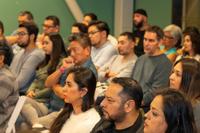

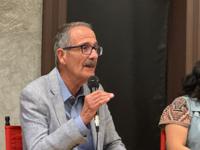

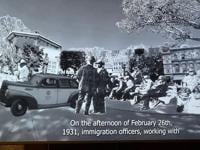

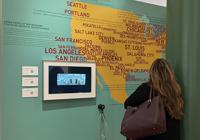

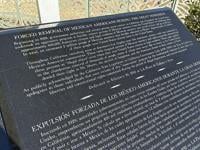







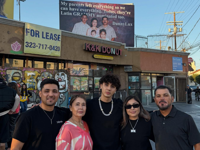
(0) comments
Welcome to the discussion.
Log In
Keep it Clean. Please avoid obscene, vulgar, lewd, racist or sexually-oriented language.
PLEASE TURN OFF YOUR CAPS LOCK.
Don't Threaten. Threats of harming another person will not be tolerated.
Be Truthful. Don't knowingly lie about anyone or anything.
Be Nice. No racism, sexism or any sort of -ism that is degrading to another person.
Be Proactive. Use the 'Report' link on each comment to let us know of abusive posts.
Share with Us. We'd love to hear eyewitness accounts, the history behind an article.